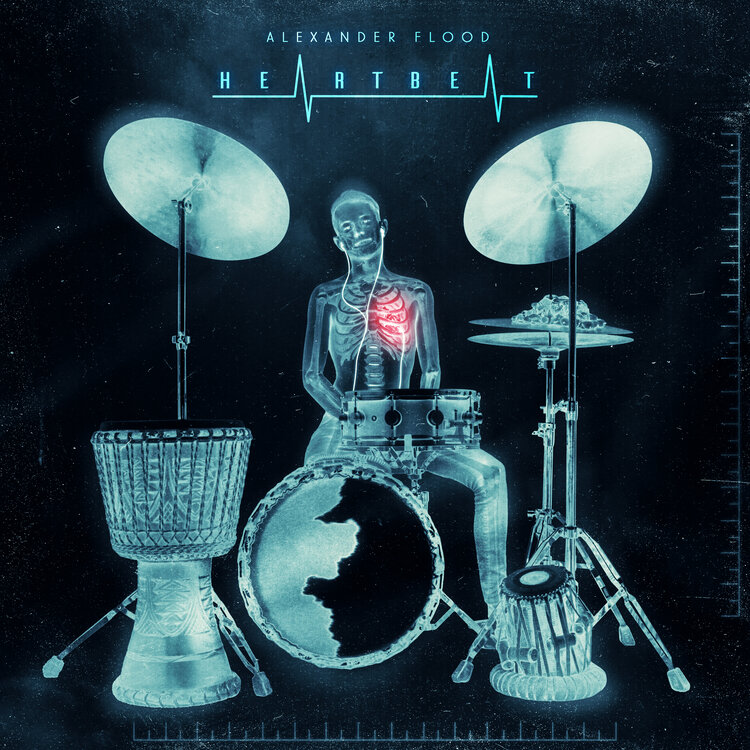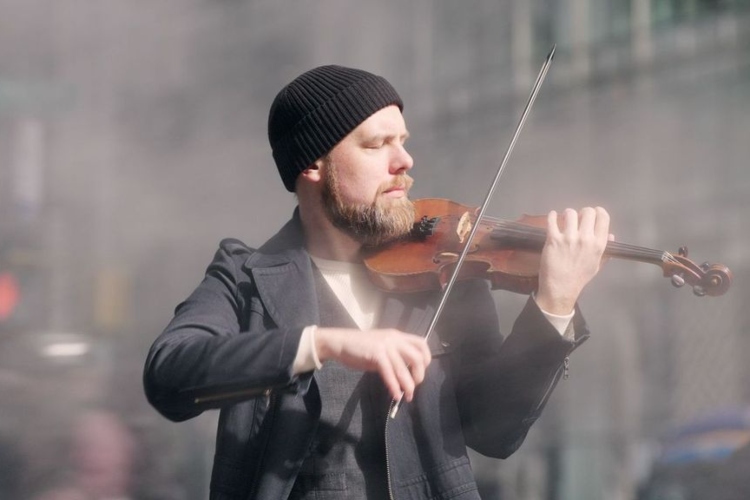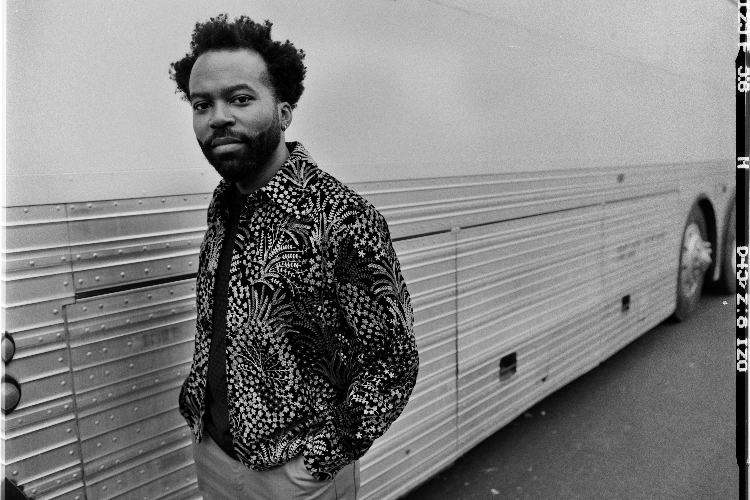Beating with Heart: Alexander Flood’s Percussive Exploration of Cultures and Technology
|
Getting your Trinity Audio player ready...
|
In 2015, Christian Scott Atunde Adjuah created the Stretch Music imprint with Ropeadope Records to support jazz rooted genre blind music that encompasses a wide range of other musical forms and cultures. While its releases have aptly fulfilled this goal, thus far they have been confined solely to the trumpeter’s own boundary-defying works. Before even listening to Alexander Flood’s debut HEARTBEAT, the album is notable as the label’s first recording led by an artist other than Scott.
Although a new leader is at the helm, the result proves true to Stretch Music’s ideals. Principally a jazz percussionist, in many ways Flood can also be seen as an ethnomusicologist as his work uniquely studies and incorporates the musical ideas of various cultures. Sometimes a particular approach predominates. For instance, “Circadian Taal” puts Indian rhythms and vocals to the fore. More often, the compositions blur the lines between cultural ideas, including some from electronic music. The results are often delightfully impossible to categorize. On “808 Defibliration” African drums quickly morph into the legendary drum machine before turning back again. While the entirety of “Afzeila” is guided by Afrobeat, it changes and evolves as it becomes more experimental and outwardly reaching.
We had an opportunity to sit down with Flood to discuss the release, his future plans, and his thoughts on music more generally.
PostGenre: HEARTBEAT is your debut solo album and the first time many listeners will encounter your music. Is there anything you would like to say to this audience by way of an introduction?
Alexander Flood: Sure. I am from the city of Adelaide which is in South Australia, right down the bottom, on the coast. In some ways, we are pretty isolated here, not just from the rest of the world but also bigger cities on Australia’s East Coast – Melbourne, Sydney, and Brisbane. When artists come through Australia, they generally visit those three cities and we often get left out down here at the bottom. So, while I was very passionate about music when I was growing up, there were not as many opportunities here. To a certain extent, I feel like that is still the case. There are a lot of talented local musicians with the same passion and drive as elsewhere, but there is just not as much of a scene to support us. I think HEARTBEAT is important because it lets people in the rest of the world hear what is happening down here.
PG: Although a more distant music scene, it does seem like you have formed a very tight group there with your band Er@ser Description which is present on the track ‘Impatience’. How did the band come to be?
AF: Thank you very much. We met through the university where we all studied music. Initially, we were playing straight-ahead jazz but we wanted to explore beyond that. The other two guys in the group are keyboard players who were interested in synthesizers and wanted to explore playing more contemporary music. We just got together a few times at first, then suddenly we had gigs booked. After some time we decided to record an album. We’ve certainly found some success here in Adelaide but the next step is to try to reach overseas and hit a larger audience. We recently finished our second studio album that will hopefully be out sometime towards the end of 2020.
PG: Turning to HEARTBEAT, what inspired you to release a solo drum album? It does not seem like there are a lot of solo drum albums out there.
AF: There was a gap between the music I am passionate about and what I was able to create with other musicians here. I have been very focused on the music of different cultures and traditions for a very long time, learning about it and exploring it with my ears but there were not many opportunities to play it. The album started as an experiment to piece these types of music and sounds together, and I wanted to play it myself and share it with others. I grew up listening to a lot of Dave Weckl’s recordings so his bandleading was an early influence. But also some solo works by people like Nate Smith. But I wouldn’t say I was directly influenced by someone’s album and thought “I want to do something similar”. There was no plan per se, it was more of an experiment that just grew and grew.
PG: Since it is a solo album is there any desire to play it live and, if so, how could that be done?
AF: Before the Coronavirus pandemic hit, I had been making plans for live performances. had some great opportunities lined up before the virus. I had two shows booked here in Australia, one in early April and another in June. Both were canceled but I would love to perform HEARTBEAT and present it around the world. Right now I am seeing if I can take it overseas later this year or next year.
As far as how to do so, you are correct that it couldn’t be exactly as laid out on the album. It will be a significantly different format in terms of instrumentation and arrangement.
I’d say half of the tracks on HEARTBEAT have three or four percussion parts layered on top of the kit, which would be impossible to play live without at least another percussionist, if not multiple. I’ve thought about using backing tracks and loops, which could work. But it seems to lose some of the energy and spontaneity of an entirely live group. The ideal scenario is all live – live bass, live horns, live keys, live synths, live percussion, and live drums. But then there is also the element of incorporating electronics. I would love to bring in an 808 and have that play some foundational rhythm with the band playing over it. There are so many different formats we could do this in too – I could do it with a three-piece or with a ten-piece band. It is very free and open. As specific as the arrangements might be on the record, they can be shaped into anything live.
PG: World music is a huge part of the recording, drawing upon African and Indian rhythms. What are your thoughts on the drum as a tool for cross-cultural communication?
AF: Drums and vocals are such raw ancient and human instruments and ways of expressing, creating, and communicating. The use of rhythm and singing goes about as far back in history as humankind itself. The rich cultural and historical depth behind music gives so much to draw from.
Drums and other rhythmic instruments are a part of almost every culture and nation, and their histories. The Indigenous Aboriginal people of Australia have percussion instruments similar to that of the clave, but interestingly there are not many examples of skinned drums that I have come across. Most nations and cultures that have a history and tradition with music and dance all share some fundamental relationships with drums and rhythm. Often specific rhythms have a defined function and purpose within society, whether to support dance, ceremonial practice, marriage, fertility, coming of age, weather, etc. Music and rhythm is such a fundamental element of so many cultures and people.
PG: At the same time, there is a clear electronic influence on the album. For instance, your piece 808 Defibrillation interestingly morphs these traditional rhythms with arguably the greatest drum machine of all time, the Roland 808.
AF: Yes, the sound is multi-dimensional. I wanted to include rhythm and sound from a long and diverse timeline of music and culture. While the 808 does not go back hundreds of years, it does have a distinct history, evolution, and purpose. And it is still used in so much music today. I really wanted to incorporate as many of my influences as best I could into this cohesive tapestry of sound to demonstrate that they really can complement each other and co-exist in the same spaces. With HEARTBEAT I’m striving to diversify our listening experiences and tear down the divides between genre and sound.
PG: It seems over time people have become more accepting of drum machines, but for a long time, there was a divide between traditional and electronic rhythms. For example, when Miles Davis started experimenting with the technology in the 1980s, a lot of critics claimed the machines were somehow “beneath him” musically. Do you think that separation still exists today or has hip hop and other music put them on the same level as a traditional drum?
AF: When the technology first came out, the machines kind of took over. They were initially intended primarily to replicate human drumming. But as the technology has further ingrained itself in music and culture, things sort of flipped with many drummers now trying to sound more like machines in terms of sonic choices, types of beats to play, phrasing, and other techniques. It is really interesting when you layer acoustic drumming with electronics to complement it or vice-versa. Being able to blend the two is a unique and beautiful collaboration between humanity and technology. One of the most relevant things drummers can explore right now is how to complement their natural skills with the technology available.
PG: In addition to composing and recording the album, you also engineered and produced it. What is your overall perspective on music production as itself a form of music-making?
AF: Since HEARTBEAT started as an experiment, I didn’t book a studio because it wasn’t going to be a project on that scale. Of course, it gradually developed into something larger but because by that point I had already found a creative process that worked for me, I didn’t necessarily sit down and write out a tune over a short period in the studio. It made more sense to me to do it from home at my own time and pace. Right now I am writing a lot more music which opens up the opportunity of recording in a studio. I am very happy with the production of HEARTBEAT but I would love to see what could be done with a similar concept in a studio environment. Removing the element of engineering and putting it in the hands of a great local engineer and knowing the gear would capture a beautiful but completely different sound. I am excited to explore this further in the future.
PG: HEARTBEAT is being released on Christian Scott Atunde Adjuah’s Stretch Music imprint through Ropeadope. How did you get connected with Christian?
AF: I am a huge Christian Scott fan. I have been completely blown away for years by everything he does, his music, his creation, and his forward-thinking.
I first met him back in 2017. I saw that he was performing at a jazz festival in rural Wangaratta, Australia, and decided I had to go see him. I booked a flight, a train, and a bus to get there. It was about a twelve-hour trip. Before that, I had already been speaking with his drummer Corey Fonville who has also been a big influence on me and with whom I took a few online lessons. In Wangaratta, I met up with Corey, we grabbed some food and chatted. Then Corey got me backstage for the group’s performance and introduced me to Christian and the band. Corey had previously shown Christian some videos of my performances so he was already somewhat familiar with me.
Then last January, I went on the Blue Note At Sea cruise where he was performing. I wanted to show him my album because at that point it was nearly done. I had no concrete plans for it yet but wanted to hear his thoughts. He sat down and listened through to the whole record. Straight away he started firing off ideas about putting it out and the possibilities of what could be done with it. A few months later he hooked me up with the team at Stretch Music and Ropeadope and the rest is history.
It has been such a crazy experience to get to where we are now. As it’s my first time working with a label it’s been a huge learning process, but it’s been an invaluable experience and I’m so lucky to have this opportunity and to work closely with Christian throughout. His mentorship has been incredibly invaluable. He is so generous with his time, knowledge, resources, and his energy and encouragement. He is just a beautiful person and a huge influence on me not only musically but as a human being as well.
HEARTBEAT, Alexander Flood’s debut album for Stretch Music / Ropeadope will be available on June 19, 2020. It also features Dylan Paul on electric bass, Tyler Venter and Lewis But-Husaim on electric guitar, David Goodwin on keyboards, KS Roopraj and Deep Sroa on vocals, Jack Stemple on synths, and Josh Chenoweth on trumpet.



